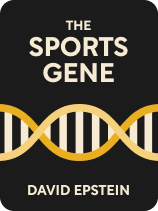

This article is an excerpt from the Shortform book guide to "The Sports Gene" by David Epstein. Shortform has the world's best summaries and analyses of books you should be reading.
Like this article? Sign up for a free trial here .
What is David Epstein’s The Sports Gene about? What role does genetic makeup play in sports success?
In The Sports Gene, David Epstein explores how our underlying genetic differences impact our performance on the sports field. As the title implies, the author suggests a strong genetic component to success in sports. However, the book also recognizes that, as complex human beings, athletes cannot be defined by genes alone.
Here’s our overview of the book’s background, context, impact, and approach.
About the Author
David Epstein has written multiple bestselling books: In addition to The Sports Gene being a New York Times bestseller, he also wrote the 2019 #1 NYT bestselling book Range: Why Generalists Triumph in a Specialized World. He has master’s degrees in environmental science and journalism. Epstein has experience in both the science and sports fields. He has worked as an ecology researcher and as a science reporter for ProPublica. His writing in the science field has received acclaim from the National Academies of Sciences, Engineering, and Medicine. He was a decorated collegiate athlete himself, and he went on to work as a senior science writer for Sports Illustrated.
Connect with David Epstein:
The Book’s Publication
Publisher: The Sports Gene was published by the Penguin Group in 2014.
Historical Context
Sports have been important to human culture throughout history, as the tradition of the Olympic games attests. For as long as sports have entertained us, we have been captivated by athletes. The quest for athletes to become bigger, stronger, and faster is never-ending. Prevailing cultural views (particularly in the United States) favor grit, determination, and practice as the driving forces of improvement in sports. However, scientific advances (particularly in the field of genetics) are shedding light on what makes elite athletes great. The Sports Gene uses modern scientific research to enhance our understanding of human performance.
Intellectual Context
David Epstein’s The Sports Gene is a research-based book. It includes discussions of race and sex from a scientific rather than a cultural perspective. Epstein acknowledges that some of the topics covered may be socially uncomfortable. He even notes that some researchers refrain from sharing their findings when they illuminate a racial divide. However, Epstein maintains that it is a disservice to both science and society to avoid discussing research findings for the sake of social comfort.
The Book’s Impact
The Sports Gene contributes to the perennial nature vs. nurture debate by counterbalancing a widespread cultural belief that nurture (practice) can always trump nature. It stands as a challenge to assertions made about the power of practice in Malcolm Gladwell’s best-selling book Outliers. As a testament to the strength of Epstein’s arguments, even Gladwell called The Sports Gene “fascinating” and “educational.”
Critical Reception
The Sports Gene has received widespread acclaim and, as Epstein notes, was purchased by both President Barack Obama and former Secretary of State Condolezza Rice. A review in The Washington Post calls it “fascinating,” and one in The Guardian calls it “dazzling” and “illuminating.”
Commentary on the Book’s Approach
The Sports Gene argues that genes have a determining effect on sports performance by discussing findings from scientific research, explaining important biology concepts, highlighting results from athletic competitions, conducting interviews with athletes and researchers, and presenting individual stories as case studies. The combination of modalities gives the audience a well-rounded perspective on Epstein’s ideas. Some critics note that the book becomes dense and loses some of its flow during technical, scientific explanations. While this may be true, readers who persevere through the more technical sections will come away with a better understanding not just of genetics and sports but of human physiology in general.
Commentary on the Book’s Organization
Each chapter covers a general theme. However, Epstein frequently bounces from one idea to another within the chapters, often introducing an idea in one chapter and then referring back to it or presenting evidence in another. Epstein also varies his style from chapter to chapter, with some chapters being full of technical, scientific content and research findings. In contrast, others have a more narrative style and focus mainly on the story of a single person or group.
As a general flow, Epstein begins by explaining why the idea that practice alone can determine success in sports is flawed. He then presents evidence on specific genes and their impact on sports performance to support this claim. In later chapters, he applies these principles to explain why certain groups of people (specifically Kenyan and Jamaican runners) excel in certain sports.

———End of Preview———
Like what you just read? Read the rest of the world's best book summary and analysis of David Epstein's "The Sports Gene" at Shortform .
Here's what you'll find in our full The Sports Gene summary :
- A look at how our genes play a determining role in our success in sports
- Why practice doesn't always guarantee success
- The fortuitous gene pairings that can lead to elite athleticism






